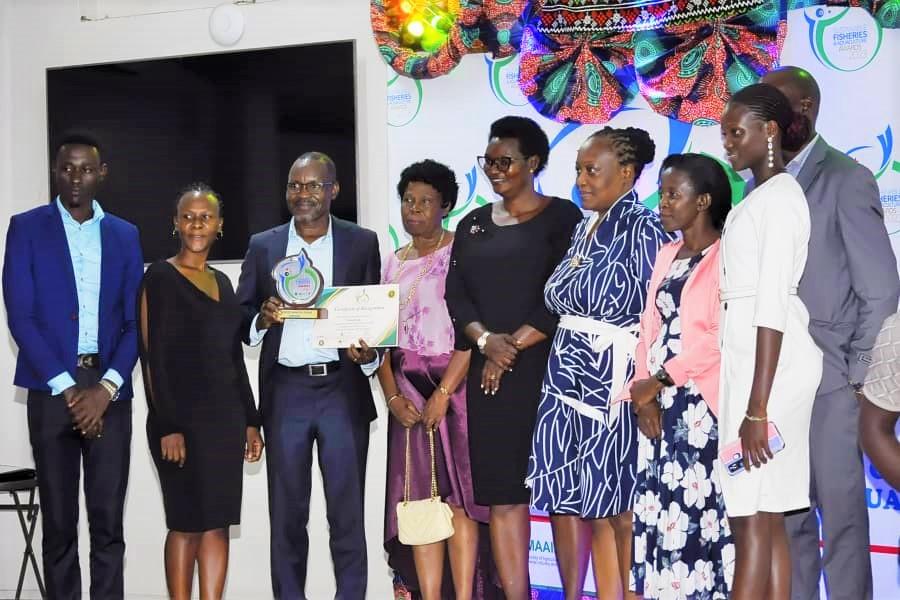The NutriFish Project under the Department of Zoology, Entomology and Fisheries Sciences, College of Natural Sciences (CoNAS), Makerere University was announced winner of the Fisheries Innovations Award 2023 at the Sustainable Fisheries and Aquaculture Awards (SFA) ceremony held on 30th June 2023 at Fairway Hotel, Kampala.

Organized by the Sustainable Fisheries Initiative (SFI), the Sustainable Fisheries and Aquaculture Awards (SFA) seek to celebrate East Africans (individuals, projects, institutions, and organizations) who devote their time, expertise and passion to a sustainable fisheries and aquaculture sector. Across 15 categories, this annual event celebrates and acknowledges regional champions working in fisheries as well as nature protection, climate action and care for communities while supporting food security and nutrition, sustainable economies, sustainable societies, sustainable environment, gender equity and equality. The SFA Awards look at major categories which include; Best Fisher of the Year, Best Landing Site of the Year, Innovations Award, Blue Heroes Award, Life time Achievers award, Young Fisheries Entrepreneur Award, Sustainable Fisheries Community Award, Green Cities of the future Award, and Women Achievers award.

The SFA awards seek to take forward the recommendations from the celebrations of the International Year of Artisanal Fisheries and Aquaculture 2022 that arose from the International Conference on Artisanal Fisheries and Aquaculture (ICAFA) held in September 2022 in Jinja.
The award criteria consisted of three stages: 1) nominations by independent parties; 2) voting for the nominees by the fisheries fraternity which took one month ending on June 20th 2023; and 3) Rigorous evaluation of contributions of the nominees by a committee consisting of Sustainable Fisheries Initiative, the Lake Victoria Fisheries Organisation (LVFO), Ministry of Agriculture, Animal Industry and Fisheries and its agencies.
About the NutriFish Project
Limited access to micronutrient-rich foods and animal protein is a key factor behind nutritional deficiencies in Uganda. It is recommended individuals consume around 25 kg of fish per year; yet, in Uganda, currently only half this amount is consumed – and intake is anticipated to further decline as the population grows.
Supported by the International Development Research Centre (IDRC) and the Australian Centre for International Agricultural Research (ACIAR) through their joint programme, Cultivate Africa’s Future Fund (CultiAF), NutriFish aims to address the nutritional needs of vulnerable groups that cannot afford expensive commercial fish but are in critical need of high quality nutritious diets. The Project is coordinated by Dr Jackson Efitre, Senior Lecturer in the Department of Zoology, Entomology and Fisheries Sciences, CoNAS, Makerere University.

Through the Project, researchers from Makerere University together with their partners from the National Fisheries Resources Research Institute (NaFIRRI) – National Agricultural Research Organization (NARO), NUTREAL Limited and McGill University, Canada in 2019 set out to increase the availability, accessibility and consumption of Small Pelagic Fishes (SPFs) for sustainable food and nutrition security and better livelihoods of vulnerable groups in Uganda. The project has over the years registered significant achievements.

NutriFish Project Achievements
Innovations
- Formulation of fish-enriched foods for vulnerable consumer groups using small silver fish (called ‘Mukene’) and fish by-products.
- Reduction of post-harvest losses by using cost-effective solar tent driers and fish containers with drainage.
- Training ‘champions’ to spread awareness about good handling and processing practices and nutritional value of small fish.
- Development of an app – electronic Catch Assessment Survey (eCAS) – to provide real-time monitoring of fish catches with smartphones.
Key results
- Five high-value nutritious products (baby food, sauce, maize meal, snacks, and seasoning) were developed by NutriFish using Mukene. Containing high levels of key micronutrients (calcium, zinc, iron), Mukene has been used to increase available fish-enriched products to the nutritionally vulnerable and improve diet diversity. A 50g portion of the baby food flour provides more than one-third of a child’s daily protein, iron, zinc, and folic acid requirements.
- Evaluated by 300 street vendors and 60 retailers in Kampala, the sauce garnered positive feedback for being quick to cook, which helps low-income families save time and energy resources. A Mukene recipe book, containing 16 recipes rich in protein, calcium, zinc, and iron, was also developed and endorsed by the Minister of State for Fisheries.
- Fishers have been helped to access loans to purchase boats and fish containers which improve hygiene and quality by improving drainage and reducing compaction of fish. Two enterprise fishing groups with over 70 boats have been established and are working together – an approach which ensures more consistent supply and standards, and results in over 3.7 tons of fish caught each month.
- By September 2022, 8,960 records of catch data had been collected and transmitted through the eCAS system by trained local enumerators. Over 200 stakeholders are using the application, including the Directorate of Fisheries Resources and the Fisheries Protection Unit, which uses the data to help prevent overfishing.
- Solar tent driers – greenhouse-like structures that reduce the risk of contamination – provide clean and efficient storage and drying, especially during the wet season, were also introduced. As well as reduced drudgery for women, the increased fish quality has doubled their incomes, from US$1 to US$2/kg, and tripled the shelf-life of dried small fish to almost five months. The driers have also attracted the attention of policymakers, with the Sectoral Committee of Parliament on Agriculture, Animal Industry, and Fisheries specifically recommending their use in April 2022 for improving fish processing.
- To encourage consumption of Mukene products, NutriFish developed a radio-based awareness campaign. More than 12 million listeners were reached by 29 different ‘spot’ messages in local languages and four 15-minute in-studio conversations – a significant step in tackling long-standing social beliefs that Mukene is a food only eaten by poor families or animals.
- The project also conducted awareness training with 326 people (200 women) to reduce gender inequalities. As a result, domestic violence dropped by 30%, the number of women in the fish value chain increased, more couples began to make joint household decisions, and more men carried out household tasks, increasing from 15% to 20%.

